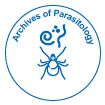Screening of Toxoplasma gondii Antibodies in Pregnant and Aborted Women Attending Wad Medani Maternity Teaching Hospital and Um Algura Hospital Using Toxo-Latex Agglutination and Electro-Chemiluminescence Immunoassay (ECLIA)
Received Date: May 05, 2017 / Accepted Date: Jun 01, 2017 / Published Date: Jun 05, 2017
Abstract
Background: Toxoplasmosis is an infection caused by an obligate intracellular parasite Toxoplasma gondii in final and intermediate host. Toxoplasma gondii is commonly associated with congenital infections that are not clinically apparent. The infection in the first trimester pregnancy may cause severe congenital anomalies or even foetal loss. In congenitally infected children can cause devastating effects including eye blindness, neurological impairment and mental retardation. The parasite distributed world-wide, in Sudan the prevalence was reported to be 34.1% and in Gezira state it was 41.7%.
Objectives: This study aimed to diagnose T. gondii infection inpregnant and aborted women by Toxo-Latex agglutination test and Electro-chemiluminescence immunoassay (ECLIA) for IgG and IgM antibodies.
Materials and Methods: Total 100 samples of venous blood collected from pregnant and aborted women, 37 and 63 samples were from participants in Wad Medani and Um Algura, respectively. These samples were diagnosed using Toxo-Latex agglutination test for IgG antibodies, Electro-chemiluminescence immunoassay for IgG antibodies and Electro-chemiluminescence immunoassay (ECLIA) for IgM antibodies.
Results: The results showed that a seropositivity of Toxoplasma IgG antibodies by Toxo-Latex agglutination test was 69% and 52.6% by Electro-chemiluminescence immunoassay.The Toxoplasma IgM seropositivity was (5.1%). There was significant difference between two methods (P<0.0001). The sensitivity and specificity of Toxo-Latex agglutination test was (94%) and (57.8%) respectively with positive predictive value (71.2%) and negative predictive value (89.6%). The seroprevalence of Toxoplasma IgG antibodies showed (67.6%) in Wad Medan and (69.8%) in Um Algura by Toxo-Latex agglutination test while by Electro-chemiluminescence immunoassay was 43.2% and 54% in Wad Medani and Um Algura respectively. The seroprevalence of Toxoplasma IgM antibodies was (7.9%) and this present in Um Algura. The high prevalence noted among age group 26-35. There is relation between the positive results with clinical symptoms; strong correlation with risk factors specially eating undercooked meat (71%), consumption of raw meat (68.1%), and contact with cats (52.1%). There was negative correlation between the seropositivity and parity number.
Conclusion: The Electro-chemiluminescence immunoassay remain high specific and sensitive method for diagnosis of Toxoplasmosis, but a high cost of both apparatus and test reagents may prevent applicability in rural area, so the Toxo-Latex agglutination test may be useful in screening for disease due to simple applicability. The study recommended that the screening of Toxoplasma gondii should be done to all pregnant women to prevent disease progression, control cats, avoiding eating raw and undercooked meat and drinking filtrated water.
Keywords: Toxoplasmosis; Sudan; Pregnant women; Toxoplasma gondii; ECLIA
Citation: Mohamed MY, Abakar AD, Talha BA, Nour BYM (2017) Screening of Toxoplasma gondii Antibodies in Pregnant and Aborted Women Attending Wad Medani Maternity Teaching Hospital and Um Algura Hospital Using Toxo-Latex Agglutination and Electro-Chemiluminescence Immunoassay (ECLIA). Arch Parasitol 1: 105.
Copyright: © 2017 Mohamed MY, et al. This is an open-access article distributed under the terms of the Creative Commons Attribution License, which permits unrestricted use, distribution, and reproduction in any medium, provided the original author and source are credited.
Share This Article
天美传媒 Access Journals
Article Usage
- Total views: 4557
- [From(publication date): 0-2017 - Jan 27, 2025]
- Breakdown by view type
- HTML page views: 3736
- PDF downloads: 821
